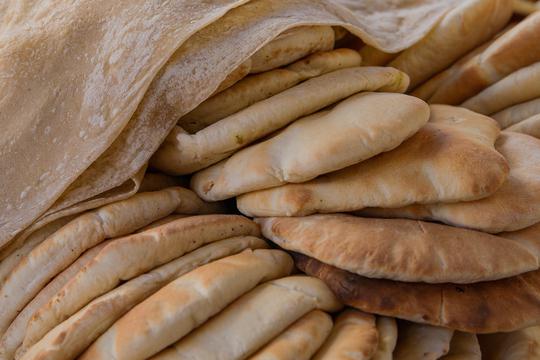
10 can't-miss dishes to try in Jordan
Eat your way through Jordan with Jodi Ettenberg as she shares ten local foods to taste on tour
Long a crossroads of culture, Jordan is home to heaps of archaeological ruins from some of the world’s most important civilizations. Before the Romans built an amphitheatre in Amman and colonnaded streets in Jerash, the mysterious Nabataeans carved an entire city straight into the sandstone. Petra is a highlight of Jordan, but the country also has a stash of natural wonders, from the desert sands of Wadi Rum to world-class diving in the Red Sea and floating on the Dead Sea’s salty waters.
Visa requirements may change, for the most up-to-date information we recommend using our Entry Requirements tool. Alternatively, check the Jordanian embassy website in your country of departure.
Recommended vaccinations include hepatitis a, rabies, and tetanus.
As advice can often change, you can check out our Entry Requirements tool for the most up-to-date details on vaccination requirements.
Summers in Jordan can be absolutely roasting, so Spring (March to May) and Autumn (September to November) are more pleasant when it comes to temperatures.
75% of the country’s rainfall falls from December to March, but this is still a good time to visit as there are fewer crowds and prices are lower.
Summers (June to August) are blisteringly hot, with temperatures reaching around 40°C (104°F) — expect 13 hours of sunshine at this time too.
Spring (March to May) and Autumn (September to November) see temperatures averaging around 25 to 30°C (77°F to 86°F), with dry weather throughout.
Winter (December to March) sees 75% of annual rainfall — particularly in the lush northern part of the country — and sometimes even snow. Temperatures tend to stay around the 5°C to 10°C (41°F to 50°F) mark, but it can get below freezing at night, particularly in the desert.
While on tour in the Middle East, it is customary and even expected to tip small service providers such as restaurant and bar waiters, hotel staff, reception, cleaning personnel, bell boys, taxis, and van drivers. Tips are regarded as an essential means of supplementing income for those working in the tourism industry.
There are several times during the trip where there's an opportunity to tip the local guides or drivers we use. You may do this individually, or your CEO will offer to collect the money and tip as a group.
Tipping your G Adventures CEO is also very much appreciated. The amount is entirely a personal preference; however, as a guideline, USD $11-13 per person, per day is our recommendation in the region. If you felt your CEO did an especially outstanding job, any additional amount is always welcome.
Jordan has very good internet access all over the country — particularly in large towns and cities like Amman. In rural areas, expect it to be more limited.
ATMs are widely available in large cities and towns, and both Visa and Mastercard are widely accepted. We’d recommend bringing both if possible as some ATMs will only accept one variety. Check with your bank to see how much you may be charged for withdrawals — consider bringing cash in USD, Euros, or GBP too.
As currency exchange rates can fluctuate often, we ask that you refer to www.xe.com for daily exchange rates.
Jordan is more liberal than many of its Middle-Eastern counterparts, and same-sex relationships here are legal. However, much of the country outside of Amman is still fairly conservative, so we’d recommend using discretion and avoiding public displays of affection.
As part of their commitment, all CEOs receive LGBTQ+ inclusion training so every traveller feels respected and welcomed on all of our tours. We commit to making our tours a safe and inclusive place for people to express their authentic selves without judgment, free from any discriminatory language or harassment.
While travelling with G Adventures, all travellers must treat each other with dignity and respect to create an environment that is positive, safe, and where everyone feels welcome. You can find out more via our LGBTQ+ travel page.
Arabic is the official language of Jordan, and the majority of the population speak it here. English is also widely spoken by much of the population — particularly in the capital.
While opinions vary in cities like Amman, the general rule of thumb is that you shouldn’t really drink the tap water in Jordan as a traveller. Stick to bottled water, which costs around 0.35 JOD.
Please note however that all drinks provided on our tours are safe to drink (including drinks with ice), as well as the water in most hotels and restaurants visited on tour. If in doubt, please ask your CEO for further info.
Generally speaking, Jordan is a very safe country in which to visit — particularly within tourist areas.
However, that said, it always pays to be aware of petty crime (like pickpocketing), tourist scams, and touts — particularly in larger cities. It’s uncommon, but female travellers might also attract some unwarranted attention. Dress modestly and you should be fine.
G Adventures takes all reasonable measures to ensure your safety and enjoyment while travelling with us. All of the included activities are properly vetted and regularly checked by us, and we take great care in choosing the right transportation, stays throughout your trip, and guides to lead your tour. However, there are always inherent risks when travelling — you can find out more via our travel safety page.